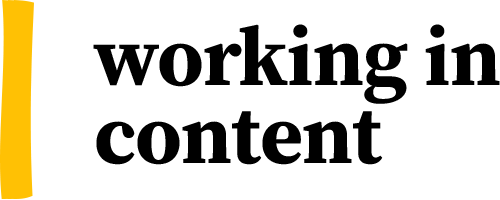In the thirteenth video of our Perspectives series, we feature Sarah Johnson, an Associate Senior Manager of Content Strategy at CVS. Sarah shares her insights on building teams that trust, focusing on the importance of authentic leadership in hiring, managing, and coaching. This presentation explores how fostering trust within a team can lead to increased collaboration, creativity, job satisfaction, and overall happiness.
[Title correct at the time of recording]
Meet our speaker
Sarah Johnson is an Assoc. Sr. Manager of Content Strategy at CVS and teaches content strategy at the Bentley University User Experience Center. She has twenty-five years experience at companies such as CVS, TIAA, Fidelity Investments, and Bank of America. She works with content teams to grow both leadership and UX skills. She has run content strategy summits within her UX teams and spear-headed a workshop, The Art of the Difficult Conversation, which she developed in conjunction with Search Inside Yourself Leadership Institute. The workshop went on to be offered corporate-wide at TIAA. She’s a graduate of the InnerMBA offered by SoundsTrue, LinkedIn, and NYU.
[Title correct at the time of recording]

About this talk
In this insightful presentation, Sarah Johnson delves into the importance of building teams on trust and how it can lead to remarkable outcomes. She emphasizes the role of authentic leadership in creating an environment where team members feel safe, supported, and empowered to do their best work.
Throughout the talk, Sarah shares practical methods and techniques she has employed while building out the Retail content strategy team at CVS. She discusses the significance of running team meetings that acknowledge accomplishments, encourage sharing work, and provide opportunities for asking for feedback. By fostering a culture of openness and transparency, teams can develop a strong sense of trust and collaboration.
Furthermore, Sarah highlights the importance of educating team members and creating a psychologically safe space where individuals can thrive. When teams trust each other and their leadership, they are more likely to take risks, innovate, and rely on one another for guidance and support without fear of appearing weak or incompetent.
By sharing her own experiences and insights, Sarah provides valuable guidance for content professionals looking to build thriving teams based on trust, authenticity, and open communication. This talk is a must-watch for anyone seeking to create a positive and productive work environment that encourages growth, creativity, and job satisfaction.
Other videos in this series
5 content professionals share leadership insights: Navigating imposter syndrome, celebrating wins, and more.
Christina Vasilevski shares tips on how people with ADHD can thrive in content design, emphasizing how their unique abilities can be leveraged to create clear, concise, and user-friendly content.
Jeneba Wint shares innovative strategies for career development, using the concept of a 'Minimum Viable Product' (MVP) from product management.
Lessons learned from Sarah
The power of trust in building thriving teams
Sarah emphasizes the critical role that trust plays in creating successful and cohesive teams. When team members trust each other and their leadership, they are more likely to collaborate effectively, share ideas openly, and support one another through challenges. This trust fosters a positive work environment that promotes job satisfaction, creativity, and overall happiness.
Authentic leadership as a foundation for trust
Throughout her talk, Sarah highlights the importance of authentic leadership in building teams that trust. By being vulnerable, transparent, and open with their teams, leaders can create a safe space where team members feel comfortable sharing their own vulnerabilities, asking for help, and providing honest feedback. This authenticity helps to break down barriers and foster genuine connections among team members.
Practical strategies for fostering trust and collaboration
Sarah shares several practical methods and techniques for building trust within teams, such as running effective team meetings that celebrate accomplishments, encourage the sharing of work, and provide opportunities for asking for feedback. She also emphasizes the value of educating team members and creating a psychologically safe environment where individuals feel supported and empowered to take risks and innovate.
The impact of trust on job satisfaction and performance
When teams operate in an environment of trust, they experience increased job satisfaction, creativity, and overall performance. Sarah's experiences at CVS demonstrate how fostering trust within her content strategy team led to improved collaboration, innovation, and the ability for team members to rely on one another for guidance and support without fear of appearing weak or incompetent.
By implementing the lessons shared by Sarah, content professionals can work towards building thriving teams that are founded on trust, authenticity, and open communication, ultimately leading to greater success and satisfaction in their work.
About Perspectives Conf
This talk is part of Track #3 - Managing people and content teams of the 2022 edition of our conference.
Perspectives Conf is the world’s first event specifically focused on the careers side of content. It’s been carefully curated to help people at all levels navigate the many facets of working in content – from being the first content person to hiring and growing a team.

Transcript of the talk
00:01 Hello everybody. And welcome to Building Teams on Trust. My name is Sarah Johnson. I'm an associate senior manager of content strategy at CVS, and I'm really happy to be here today to talk to you about my experience, building a content strategy team.
00:19 Um, at CVS, I've done a lot of hiring and team building in my first year there. And I found that creating trust among the team has helped us collaborate and enjoy work more.
00:32 So why do teams need trust? Um, compared with people at low trust companies, people at high trust companies report the following 74% less stress, 106 more percent, more energy at work and 76% more engagement.
00:55 And that's from a publication at the Harvard business review, which if you're interested in building teams with trust, they have a lot of wonderful publications and articles that you can search for online
01:09 Teams that trust have more teamwork and collaboration. That's probably why it's more fun and less stressful. People feel free to ask questions without worrying about how they'll be perceived.
01:20 If they'll be thought less then if they'll be judged, if people will be competitive with, them, and leadership can depend on the team and vice versa.
01:29 When I trust someone to do their work without my micromanaging them, they feel appreciated and gratified with the sense of responsibility and they take more ownership, trust, removes the need to micromanage, which frees up time.
01:44 We can spend mentoring, educating, and working more closely with peers. Um, excuse me, why micromanage? When we can take time to get to know people and help them better their skills and do their jobs better
02:03 Teams, that trust have psychological safety. Again, people feel free to ask questions without fear of repercussions. Team members are more likely to speak their minds when they feel safe, articulating their challenges or taking risks to suggest innovative approaches.
02:21 And the more people can come to you with their challenges, the more successful your team is going to be. Um, if you're a micromanaging boss or someone who is, um, let me think of the word like scolding in their feedback or critical it's, it's not helpful to creating, uh, an environment of psychological
02:40 safety and people won't come to you with their challenges. And then that's where things go off the rails. Um, when we have teams that trust people are more likely to escalate issues or ask leadership for help and clarification.
02:54 And that's exactly what I'm talking about. We want people to come to us when having trouble and need our help
03:05 Teams that trust don't have isolating behaviors, trust, empowers collaboration. We want people to work together. We want everybody to be involved, not like my father always told me two heads are better than one.
03:18 And that's, that's truly the case. When team members are trusted, they feel appreciated and they're more likely to stretch for you.
03:27 The more I trust someone to do their work at CVS, the more I feel, um, that they feel rewarded and like a part of a team, that means something and the more likely they are to stretch, to create the success of that team.
03:42 People are also more likely to make time for other team members. One of the things we encourage is peer reviews.
03:49 And again, getting a second set of eyes can help create a more successful digital experience. Those who are trusted rise to the occasion of that trust and act with integrity, which leads to more satisfaction in their work.
04:04 And you can see how all of this team interaction and collaboration and sharing, um, would help people just be happier, like having human connection at work makes it more fun and interesting.
04:20 Um, teams that trust share their vulnerability team members feel free to ask questions and let others know what they don't know and what they need feedback on.
04:31 And leading with vulnerability builds that trust having feelings, connecting with others as human beings, showing appreciation for their work needing help yourself or asking others with questions.
04:44 And for me, starting as a new leader at CVS, I had a lot of questions. I had a team of people that grew from six to 12 and, um, there was a lot that I didn't know, and I had questions from my other, from other managers, but I also had questions for my team members.
05:02 Um, and I think the fact that I trusted them to go to them with my shortcomings or my, my lack of knowledge, helped them feel an important part of the team and that I trusted them.
05:16 So what is this vulnerability all about vulnerability is a powerful thing and sharing your vulnerability? This is one of the most important skills that a manager can have.
05:29 In my opinion, one important aspect of trust is often the most uncomfortable, um, for managers and employees alike. And this is vulnerability.
05:39 Vulnerability is a state of being exposed for what you don't know for how you feel for who you are in any way, any range of soft spots you could have sharing your vulnerability, makes you human to your team.
05:52 Members.
05:56 Vulnerability is a very powerful way to support a trusting and positive team culture. When I show up as a human for other humans and we're all in it together, sharing my vulnerability, saying what I don't know, uh, having a hard day and not taking it out on people, but letting them know, um, has really
06:16 brought our team together as a, as a wholesome unit. And it's like, it's the most rewarding thing to me in my job.
06:25 So why all this vulnerability, when you demonstrate vulnerability, it allows team members to feel more comfortable being vulnerable with you.
06:35 And this might look like being open and honest with their concerns, questions, mistakes, and roadblocks, which ultimately allows for a stronger team performance.
06:44 And one of the things I really appreciate is when a team member comes to me with a challenge in a relationship, say with product or, uh, with their UX designer or when they come to me for feedback on their work, I feel that they trust me.
07:03 Um, they don't feel like I'll think of them as less than, or why can't they do this themselves, but they feel like part of a team.
07:11 And that I'm part of that team with them. And I think sharing my vulnerability builds that that sense of team.
07:19 So there are a lot of ways to demonstrate vulnerability. Uh, these can include asking for help or feedback on my own work.
07:30 One of the things I did was when it was review season, I put together a Miro board, which is like, um, you all probably know it's a digital whiteboard.
07:39 And I created a space where the team could evaluate me on what I did well, what I could do better, how I could improve my relationship with them.
07:49 And then just overall feedback. And I shut down the team meeting and let them all go work on the board.
07:57 Um, so it was anonymous and I could get feedback from the team. And it was really interesting. It gives me goosebumps to talk about it, that they felt safe enough, to be honest with me.
08:08 And it was interesting because of the things I did well, I knew I did well and the things that I needed to work on, I knew I needed to work on, but I think letting the team give me that feedback again, made them feel part of something and showed my vulnerability and let them into my life as a manager
08:26 and all of this stuff, escalates and snowballs to create an amazing sense of camaraderie. Um, try to admit mistakes and remain transparent as things are going off the rails and let people know if things are going on in the company and let people know, and then admit what you don't know.
08:46 Um, and when I meant what, I don't know, I either go to the team or go to other people on the management team, but let people know, like, I don't know, maybe we should have so-and-so look at us or maybe this person could help us with this.
09:01 And to be honest, even when it doesn't serve you like, and that can be letting people know you made a mistake, um, letting people know difficult things about their performance and the other most important thing is to connect with your team, like to really listen to them, really listen to their concerns
09:23 and hear what they're saying. If they're having challenges, don't go to it as it's their fault. You want to really listen to what's going on and try and debunk the situation.
09:34 So let's look at what trust looks like
09:39 Showing appreciation. So always acknowledge the work of your team. When a team member is appreciated, they're happier, more creative and feel more like a part of something important.
09:51 And this trust and appreciation leads to innovation. It gives people a freedom, a spark of like, Hey, I know what I'm doing.
09:59 I'm, I've done some good things before. Let's give this a try. One of the things I do in our team meeting, and I started this when I joined CVS was one of the first things we do is we talk about our successes, large and small, and people were stymied by this.
10:16 When I started and I shared something small. And once, once people sort of got what it was about now, everybody's like clamoring to share their successes, large and small, and some people want to share their challenges as well.
10:30 And it's become a wonderful, um, group bonding thing about what's going on.
10:36 And it also raises conversations and gives people a chance to acknowledge each other and appreciate each other. So listening to really hear, and I mentioned that the importance of listening, so I use the opportunity of one-on-ones and team meetings to really listen to what's going on in the team.
10:55 And the more people are truly listened to. The more I listen to them and actually respond, the more appreciated they feel and the more they trust, I try not to interrupt or interject, which is hard and jot down a note.
11:09 If you need to come back to your thought, when they're done and validate their thoughts and feelings, let them know.
11:14 You really hear that. If something's difficult, you you're trying to understand so that you can help, like really listen and listen without blaming.
11:25 You know, that's, that's a key part of this, um, mentoring trust each team member to manage and make decisions about the content they're in charge of.
11:36 So offer constructive feedback when you're mentoring as a form of coaching and rely on them to make the final decisions.
11:44 If they make a mistake, they'll learn from their mistakes, but allow them to make the final decision. And part of their process might be to come to you for sign off.
11:51 And that's cool. Identify gaps in knowledge or experience and coach your team to fill in these gaps, be available and don't micromanage them.
12:01 Micromanager micromanaging is the killer of creativity. Educating your team, offer presentations on topics, such as conflict, collaboration and difficult conversations.
12:14 So you give people the tools. They need to manage challenging situations, but it also puts on the table that wow, people have conflict.
12:22 People have difficult conversations. It's not just me. Let's talk about this. Um, these, these help giving people tools for difficult situations is super helpful.
12:33 And these talks also open the floor for people to share challenging experiences of their own and to talk to their team members about those experience and team members are also more likely to come to you with their difficulties.
12:45 If these topics are out in the open and they know they're common and not unique to them that there's not something wrong with them remaining transparent because people's jobs and livelihoods, um, rely on how they're doing the team needs to know what's going on within content design UX and the company
13:06 as a whole. And I often have people asking questions like if there is an attrition or if we're hiring more, what's going on, what's happening.
13:15 If somebody leaves as, as I, we letting people go, like people need to know what's going on all the time, regular updates help them feel safe and they trust and rely on you.
13:25 And if you don't know something, just tell them and, and try to find out. So finally, building a team that trusts I have weekly one-on-ones, um, which empower you to build a relationship with each person you lead.
13:42 It helps you build a sense of personal relationship so that you understand what people deal with on a weekly basis.
13:51 It gives a forum for people to talk about their challenges and roadblocks, as well as their successes, so that you get to know what they deal with on a daily basis.
14:00 They don't feel like they're in it alone. It gives you a chance to acknowledge and appreciate their work while, giving them any constructive feedback that's necessary.
14:10 It also allows you the time and space to really listen. And again, that's relationship building. We hold weekly team meetings, our jobs, and our livelihoods depend on our work and our work life.
14:25 And like I said, people need to know what's happening across UX and within the company, regular updates, help team members trust and rely on you.
14:35 Time to educate around content design or facing challenges, creates a forum for people to engage and share knowledge and that's time for the team to connect and feel like a team.
14:46 This is where we really come together once a week for an hour and a half, we do something educational. We share work for feedback and collaboration, or just to show what's going on in a different part of the team.
14:59 And it's a super bonding collaborative experience that I typically lead the team meetings, but I'm getting other people to lead the team meetings as well.
15:09 And to give everybody a sense of ownership of the team that we're all in this together, and I'm not like the big, bad boss, we do collaboration sessions every week.
15:20 People get to know each other better in terms of skills and expertise and communication styles. So they trust them a lot.
15:27 Excuse me, rely on each other and go to each other for feedback. Everyone gains appreciation for the unique qualities they bring to the work.
15:38 And we do, um, encourage peer reviews where these are one-on-one collaboration sessions, with a peer, the build trust, communication, and relationship.
15:48 And once you know who who's really good at what you know who to go to, if you need that set of eyes like, oh, I'm not good at this particular thing.
15:57 I'm going to go to Jasmine because she's really good at that peer reviews not only serve their work, but they help build a more cohesive and trusting team.
16:07 And this is all about getting people into owning the team together as a team.
16:14 So building your team on trust, don't be afraid to show your vulnerability, encourage vulnerability in your team and lead by example.
16:23 And one of the greatest things about building the team on trusting everybody, creating ownership of the team. When I, I was recently out, um, for a month and the team, my team ran itself, people stepped in and took ownership of various duties of mine.
16:43 And I trusted them to do this well. And to reach out to me if they needed me. And to me, that was one of the most rewarding things I've experienced in my work life.
16:56 You can do this, you know, it takes practice to be vulnerable and oftentimes the willingness to take a risk and build real connection with people.
17:04 And it takes practice, practice, practice, but you can do it. And it's honestly one of the most rewarding things about my work.
17:13 I want to thank you for listening. And, um, it's been wonderful talking to you about building teams that trust. Thank you very much.
17:22 Bye.
Want to know when the next video from Perspectives Conf is published on our website? Sign up for our weekly newsletter in the box below to get notified.

















